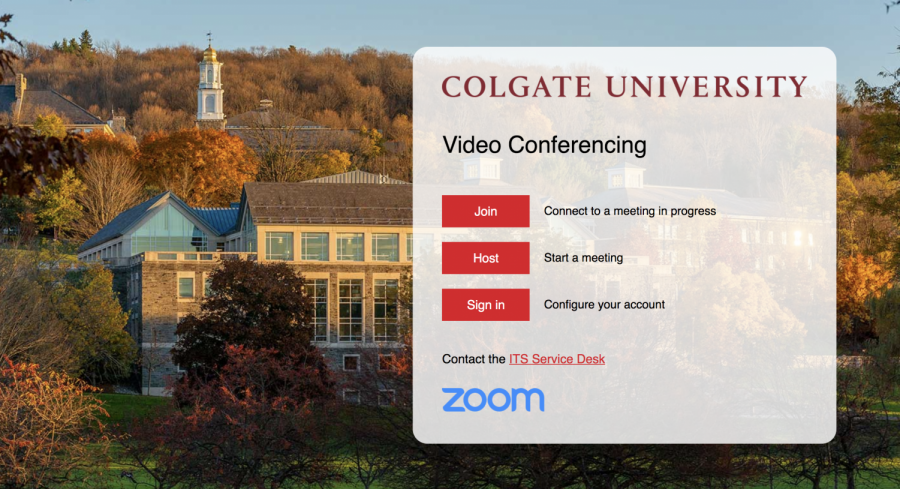Admin and Faculty Address Online Learning Obstacles
Online instruction of all courses began Monday, March 30 following the University’s cancellation of on-campus instruction for the remainder of the spring semester due to the COVID-19 pandemic. In an email sent to students and faculty on March 12, President Brian Casey announced the extension of spring break by an extra week to allow for training and preparation of faculty and staff amid the transition to online instruction.
Professors are continuing instruction through a variety of means, from all-class meetings via Zoom to videotaped lectures, online forums and blog posts. Olive B. O’Connor Creative Writing Fellow Annie Vitalsey, who is using a combination of teaching strategies, expressed concern for her students’ mental health and ability to be productive learners under the circumstances.
“More realistically, I worry about how much peer interaction is essential to the learning process, and how now it is limited,” Vitalsey said. “The spontaneous learning that happens when students share the same space consistently is, in my opinion, one of the most important parts of the collegiate experience.”
One student weighed in on her professor’s decision to shift their course to asynchronous learning. Sophomore Sophie Clark said the majority of her courses meet on Zoom during regular class times, with an exception.
“For my Organic Chemistry class, my professor is filming lectures and sending them out,” Clark said. “I am looking forward to seeing if the features of a recorded lecture will benefit my learning.”
According to the University website, the Center for Learning and Teaching Resources (CLTR) acknowledged the impact that online education will play in student’s abilities to continue their courses. The website highlights the University’s efforts to limit any further academic disruptions and maintain quality and expectations for learning and course material. The website also encourages students who may not have access to technology and resources necessary for online instruction to seek support from the ITS department.
Associate Provost for Equity and Diversity and Associate Professor of Philosophy Maura Tumulty said that equity and accessibility have been widespread efforts through the transition to online learning.
“Across the institution, in groups both large and small…questions about how this transition would differentially impact various groups of students was always part of the conversation. Concerns about equity for students with less reliable internet access, or who would need to assume childcare responsibilities for younger siblings, were among the reasons why faculty were encouraged to think about asynchronous teaching/learning methods rather than relying exclusively on synchronous ones,” Tumulty said.
Senior Advisor to the President Christopher Wells said the university recognizes the inequity of home learning environments and is working to mitigate this in the transition to online learning.
“Without altering our rigorous academic standards, the faculty are working to minimize any disadvantages for students in this online environment,” Wells said. “There’s not a lot that Colgate can do to shape home environments, of course, which is one of the reasons that Colgate granted every request from every student who wished to remain on campus. Colgate also made the decision to refund room and board charges for remote-learning students on financial aid for whom these charges were wholly or partially covered by grant aid; this refundable credit may help students who need to augment internet connectivity at home,” Wells said.
According to Wells, the Dean of the Faculty Office shared an internal communication in which they acknowledge the diverse factors and challenges impacting students in the transition to remote learning, including internet access, home environment and childcare obligations. Noting that while synchronous instruction comes closest to on-campus instruction, the statement addresses the equity of synchronous and asynchronous forms of online learning.
“Our students, who previously had shared not only a campus and its technological infrastructure, but also a time zone, now find themselves dispersed in 15 different time zones across the globe,” the statement says. “These, of course, are but some of the purely practical considerations that compelled some faculty to take on the difficult work of pre-recording lectures they regularly deliver spontaneously, of developing problem sets that students can work diligently through each at their own pace, or of creating a blog with and for students to house course content for the rest of the semester.”
The statement notes that changes will be vast and must create a versatile learning experience for students in diverse circumstances.
“There are important pedagogical factors as well. Asynchronous course materials can be more readily accessible for students with learning accommodations or visual, auditory, or other disabilities. They allow students the opportunity to digest content and concepts at their own pace and to revisit and review the course material they find most challenging. And, perhaps especially important in this particular moment, asynchronous instruction can allow a student who falls ill—or who is caring for a family member who has fallen ill—to attend to their health and resume the course once they have recovered,” the statement says.
Senior Grace DiRisio said that while online instruction privileges those with better access to technology, she feels her professors recognize this inequity and provide support for students.
“Of course [online instruction] privileges people with computers and Wifi access because it’s literally impossible to have access to learning materials without those things. For my [computer science] class, most of the class uses the laptops that are in the classroom at Colgate just because you not only need a computer, but it needs to be new and able to handle all of the simulations we are doing, so you can’t have a slow or older machine or else it can’t handle the code,” DiRisio said. “My [computer science] professor said before we left that if you don’t think your machine can handle the coding, come talk to [them] and we can figure out a way you can lend the Olin laptops.”
In an email on March 25 from Provost and Dean of Faculty Tracey Hucks, Hucks announced Colgate’s decision to offer students pass/fail (P/X) grades for all courses this semester. Students have the option to accept the respective letter grade for their courses, or default to the P/X system. As opposed to the University’s traditional satisfactory/unsatisfactory (S/U) option offered to upperclassmen who have completed all of their general, major and minor requirements, this circumstance would permit any passing grade rather than the typical C- threshold.
Sophomore Sally McGee said she felt relieved following the announcement, expressing appreciation for the University’s attempt to promote equity.
“I think that the change to online classes was daunting,” McGee said. “But the administration’s decision to allow students the options of pass/fail or keeping a letter grade really alleviated some anxieties.”
DiRiso echoed McGee’s sentiment.
“I’m sure I’m lucky with the professors I have and other professors may be less accommodating which could have a terrible impact on everyone’s learning,” DiRisio said. “We are in a pandemic and we need to do everything virtually, but it of course advantages others, which is why I think it’s good Colgate did the P/X grading option.”
DiRisio said that while she feels synchronous instruction of class can put students located further from campus at a disadvantage, some of her faculty have provided asynchronous pre-recorded lectures to students to address this issue.
“[Online instruction] also privileges people when you think about time zones, so people that live in certain areas that are more in line with Colgate’s time zone can go to their classes easier…Some senior seminars are at 7 p.m. so that could be in the middle of the night for people who live internationally,” DiRisio said.
Associate Professor of Anthropology and Middle Eastern and Islamic Civilization Studies Emilio Spadola expressed gratitude for the support among faculty and administration amid challenges associated with the transition.
“I’ve been deeply impressed and grateful to my colleagues across the University for exceptional guidance and support, not only logistical and technical guidance, but also moral support for facing the pedagogical as well as basic human challenges to everyone in or at Colgate,” Spadola said.
Associate Dean of the Faculty for Curricular and Academic Affairs Douglas Johnson also emailed students the privacy measures students and faculty must follow for the remainder of the semester of online instruction. Johnson highlighted that recording or sharing any course, participation or lecture material violates the University’s Code of Student Conduct.
“Administratively, the challenges have primarily been figuring out logistics in a constantly changing landscape regarding social distancing, limiting employee presence on campus, planning for illnesses, technology challenges and other disruptions,” Johnson said.
On Sunday, March 29, the day prior to the start of online instruction, Hucks sent an email to the student body commending the faculty for their commitment to their work amid the challenges online instruction may present. Hucks noted the unprecedented nature of the transition.
“We enter into a moment unseen in Colgate’s history. Its academic classrooms will be absent of your presence, the corridors of its halls will be silent of your footsteps, and the face-to-face engagement we have mastered for over 200 years will be mediated through technology bridging thousands of miles. As everyone peers in front of their individual screens tomorrow, know that we will chart a path forward together for the next five weeks,” Hucks said.
Despite extending spring break by a week, the University announced the decision to keep the original final day of classes and examination period the same, Friday, May 1 and Friday, May 8, respectively.

Kirby Goodman is a senior from Minneapolis, Minnesota concentrating in peace and conflict studies with a minor in political science. She's previously served as...
Greta Ferdinand is a senior from Portsmouth, NH concentrating in mathematics with a minor in philosophy. She has previously served as news editor and contributes...













Eric Wilson • Apr 8, 2020 at 7:52 am
I really appreciate your work especially the research part of it which made the online learning obstacles very easy to understand. Keep posting such kind of blogs as they are really informative, I also suggest you to visit expertlearn.com. wish you good luck for your future blogs.
Jim Leach • Apr 7, 2020 at 11:24 am
Thanks for this informative, in-depth look at the challenges confronting Colgate and students in this crisis. Great reporting.